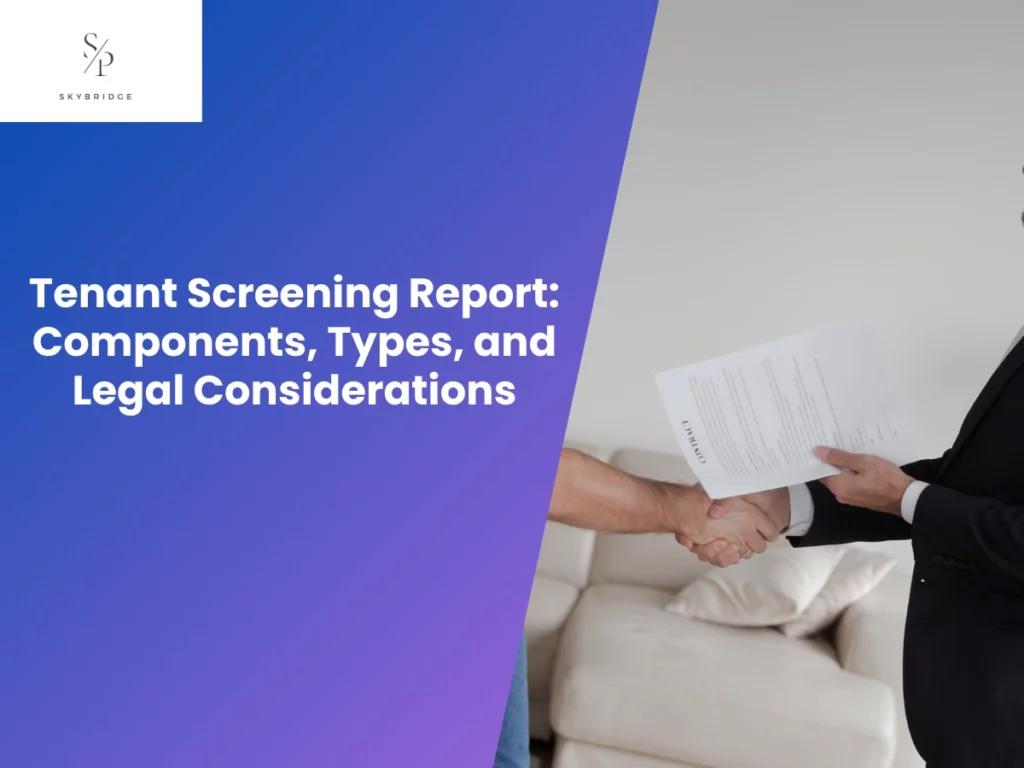Tenant screening reports are an invaluable resource for landlords to make informed, risk-free decisions when selecting tenants. These reports provide a detailed assessment of a prospective tenant’s financial reliability, criminal history, and eviction record, helping landlords avoid potential issues such as late rent payments or property damage. By using a screening report, landlords can protect their investments and ensure they are choosing tenants who meet the required standards.
Beyond risk mitigation, tenant screening reports also ensure landlords comply with legal requirements, including the Fair Housing Act and the Fair Credit Reporting Act. A comprehensive screening includes various components, such as credit scores, criminal background checks, and eviction histories. Landlords can select from portable, standalone, or bundled tenant screening reports, depending on the level of detail required for each situation.
By adhering to best practices, such as using consistent criteria and obtaining written consent, landlords can streamline the tenant screening process while maintaining legal compliance and protecting their investments.
What is a Tenant Screening Report?
A tenant screening report is a document that reveals a prospective tenant’s background, including credit, criminal, and eviction history. It provides landlords with crucial information about the applicant’s financial reliability, past rental behavior, and overall suitability for the property.
To generate the report, landlords must obtain written consent from the tenant. Once approved, a third-party screening service gathers data from sources like credit bureaus, law enforcement agencies, and court records. The report helps landlords make informed decisions, ensuring they choose tenants who are financially stable and trustworthy.
Why is Tenant Screening Report Important?
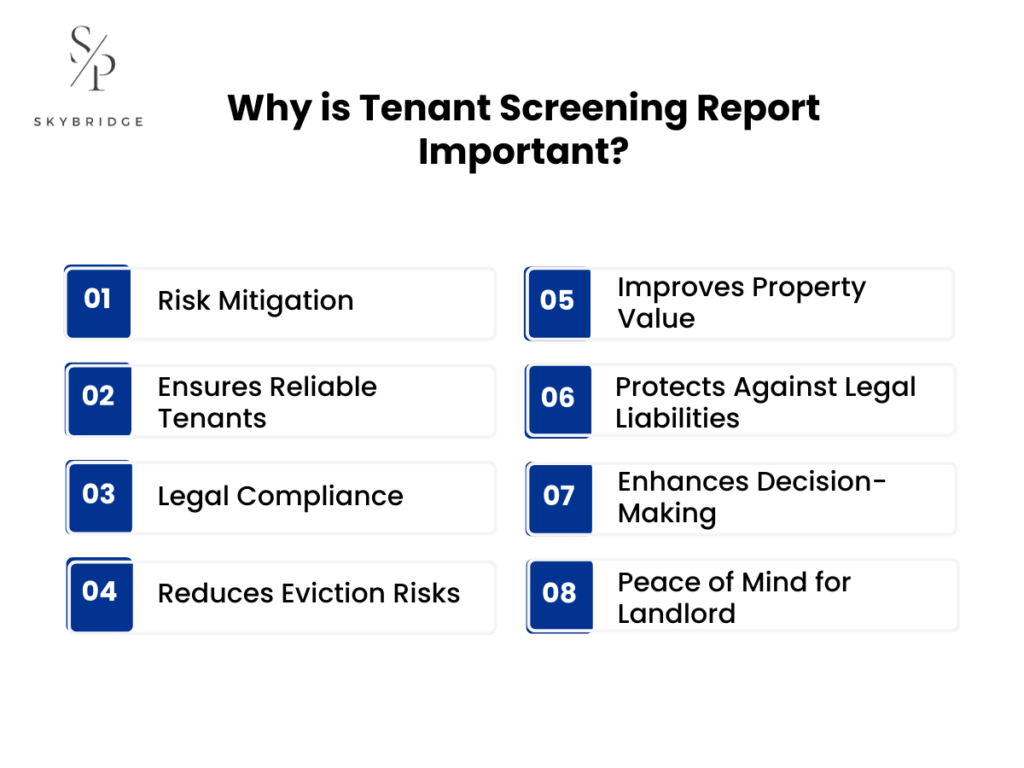
A tenant screening report is crucial to help landlords make informed decisions by assessing a prospective tenant’s reliability and financial responsibility. It reduces the risk of renting to tenants with a history of late payments, property damage, or legal issues. Additionally, these reports ensure compliance with legal regulations and help landlords maintain a fair, non-discriminatory process.
- Risk Mitigation
Tenant screening reports help identify potential risks, such as poor financial history or criminal behavior, reducing the chances of problematic tenants. - Ensures Reliable Tenants
These reports provide insights into a tenant’s financial stability and rental history, helping landlords select tenants who are more likely to pay rent on time and follow rules. - Legal Compliance
Using tenant screening reports ensures landlords comply with regulations like the Fair Housing Act and Fair Credit Reporting Act, avoiding discrimination and legal violations. - Reduces Eviction Risks
By checking a tenant’s eviction history, landlords can avoid renting to individuals with a track record of violating lease agreements or failing to pay rent. - Improves Property Value
Reliable tenants who care for the property and pay rent on time contribute to maintaining or increasing the property’s value over time. - Protects Against Legal Liabilities
Screening helps landlords avoid renting to tenants who could expose them to legal liabilities, such as those involved in criminal activities or disputes. - Enhances Decision-Making
Tenant screening reports provide essential information, empowering landlords to make more informed, confident decisions when choosing tenants. - Peace of Mind for Landlord
With a comprehensive screening process, landlords can feel assured that they are renting to trustworthy tenants, reducing stress and uncertainty.
What are the Key Components of a Tenant Screening Report?
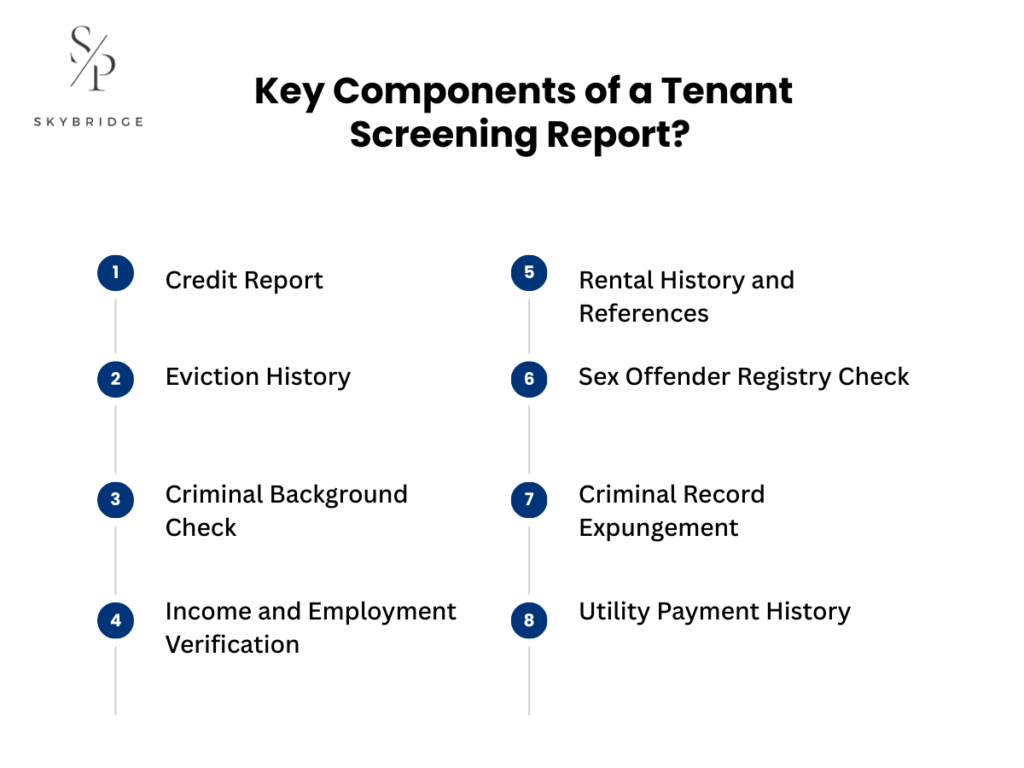
A tenant screening report includes essential components like credit reports, eviction history, criminal background checks, income verification, and rental history. These factors provide landlords with a comprehensive view of an applicant’s ability to manage finances, maintain a property, and adhere to rental agreements, helping landlords make well-rounded decisions.
Credit Report
A credit report is a critical component of the tenant screening process, providing detailed information on a tenant’s financial behavior. It includes the tenant’s credit score, also known as a resident score, which typically ranges from 300 to 850, outstanding debts, and a history of late payments or defaults. Landlords use this information to evaluate the applicant’s ability to pay rent on time and handle financial responsibilities. A strong credit score (above 700) indicates a financially responsible tenant, while a lower score (between 600) could signal potential risks for missed payments or late rent.
Eviction History
Eviction records provide critical information about a tenant’s past rental behavior, revealing reasons for eviction such as non-payment, lease violations, or property damage. Multiple evictions are a strong warning sign of potential future issues, while a single eviction might be less concerning if it was due to temporary circumstances. Landlords use this information to assess the risk of renting to an applicant, as frequent evictions can indicate a higher likelihood of ongoing problems, including late payments or disputes.
Criminal Background Check
A criminal background check is a crucial component in tenant screening, revealing any past criminal convictions or charges. Landlords typically focus on serious offenses, such as felonies or violent crimes, which may impact the safety of the property and its residents. Non-violent or older offenses might be less of a concern, depending on the context. A clean criminal record can give landlords confidence that the tenant poses minimal risk, while a history of criminal behavior may signal potential issues with safety or reliability.
Income and Employment Verification
Verifying income and employment is crucial for landlords to ensure that a prospective tenant can reliably afford rent. By reviewing documents like pay stubs, tax returns, or bank statements, landlords can confirm the tenant’s financial stability. A consistent income and steady employment history suggest the tenant will make timely payments. For self-employed tenants, alternative proof, like bank statements or contracts, may be used. This verification reduces the risk of rental payment issues and ensures a responsible tenant selection.
Rental History and References
Reviewing rental history and references is essential for landlords to gauge a tenant’s reliability and past behavior. Positive references from previous landlords indicate that the tenant consistently paid rent on time, respected property rules, and maintained the unit well. Conversely, negative feedback, such as late payments, property damage, or disputes, can be a red flag. By checking rental history, landlords gain a clearer understanding of the tenant’s potential to fulfill the lease agreement and maintain the property throughout the rental period.
Sex Offender Registry Check
A sex offender registry check is a critical step in tenant screening, ensuring the safety and security of the property and its residents. Landlords check both national and state-level sex offender registries to see if an applicant has any convictions related to sexual offenses. While a match may raise concerns, factors like the nature of the offense and the time elapsed since conviction should also be considered. This check helps landlords make informed decisions while maintaining a safe and secure environment for all tenants.
Criminal Record Expungement
When a criminal record is expunged, the offense is legally erased or sealed, meaning it cannot be used against the tenant during the screening process. Landlords are prohibited from considering expunged offenses under Fair Housing Laws and state-specific regulations that protect tenants’ rights to a fresh start. Tenants are not obligated to disclose expunged records, and landlords must comply with these laws to avoid discrimination. Understanding these legal requirements ensures landlords follow fair and lawful practices when screening tenants.
Utility Payment History
Reviewing a tenant’s utility payment history provides valuable insight into their financial habits and reliability. Timely payment of utility bills such as electricity, water, and gas indicates that the tenant is responsible with regular expenses, suggesting they are more likely to pay rent on time. On the other hand, a history of missed or late payments may raise concerns about their ability to meet rental obligations. Verifying utility payments helps landlords make well-informed decisions and minimize future financial risks.
How to Obtain a Rental Application Screening Report?
To obtain a rental application screening report, landlords must first get written consent from the tenant, then request the report from a third-party service, which compiles data from sources like credit bureaus and criminal databases. Once the report is ready, landlords can review it to make an informed decision about the tenant’s suitability.
Steps to Obtain a Tenant Screening Report:
- Obtain written consent: Ensure the tenant signs a consent form authorizing you to access their credit, criminal, and eviction history.
- Choose a screening provider: Select a trusted third-party provider that offers comprehensive reports, including credit checks, criminal background checks, and rental history.
- Submit tenant details: Provide the tenant’s basic details, such as their name, address, and consent form, to the screening service.
- Review the report: Analyze the results, looking for red flags like poor credit scores, past evictions, or criminal records that may affect the rental decision.
Who Can Request a Tenant Screening Report
Only certain individuals or entities, such as landlords, property managers, or authorized agents, can request a tenant screening report. The request must always be made with the tenant’s written consent, ensuring the process complies with legal regulations. This ensures that only those with a legitimate interest in the tenant’s suitability can access sensitive information.
Key individuals who can request a tenant screening report:
- Landlords: Property owners renting out residential units can request the report to evaluate prospective tenants.
- Property Managers: Authorized agents managing rental properties on behalf of landlords can request the screening report.
- Authorized Agents: In some cases, third-party agents or leasing agents may be permitted to request the report with prior authorization from the landlord or property manager.
Timeframe for Receiving a Tenant Screening Report
The entire tenant screening process typically takes between 24 to 72 hours, depending on the type of checks involved and the service provider used. While some components, like credit score verification, can be completed within a few hours, others, such as criminal history or eviction reviews, may take longer to process.
Timeframe for Tenant Screening Components:
| Tenant Screening Stage | Maximum Duration |
| Credit Report & Score Verification | 2-3 hours |
| National & State Criminal History Review | 1 to 3 days |
| Past Evictions & Rental History Review | 2 to 4 days |
| Income Verification & Cash Flow Report | 2 to 5 days |
Several factors can influence how quickly a screening report is generated. These variables can lead to delays or faster processing, depending on circumstances. The following key elements often determine how quickly a tenant screening report is generated:
- Tenant Delays in Authorization: Delays in obtaining tenant consent to run the checks can extend the screening process.
- Completeness of the Tenant Application: Missing or incomplete information can lead to delays in processing.
- Responsiveness from Employers and References: Slow replies from employers or references can delay verification of employment and rental history.
- Depth of Background Check Requested: More detailed checks (e.g., criminal history, eviction records) take longer to process.
- Applicant Responsiveness: Delays in tenant communication or providing necessary documents can slow the process.
- Screening Service or Software Used: The efficiency and capabilities of the screening provider can affect how quickly the report is generated.
Types of Tenant Screening Reports
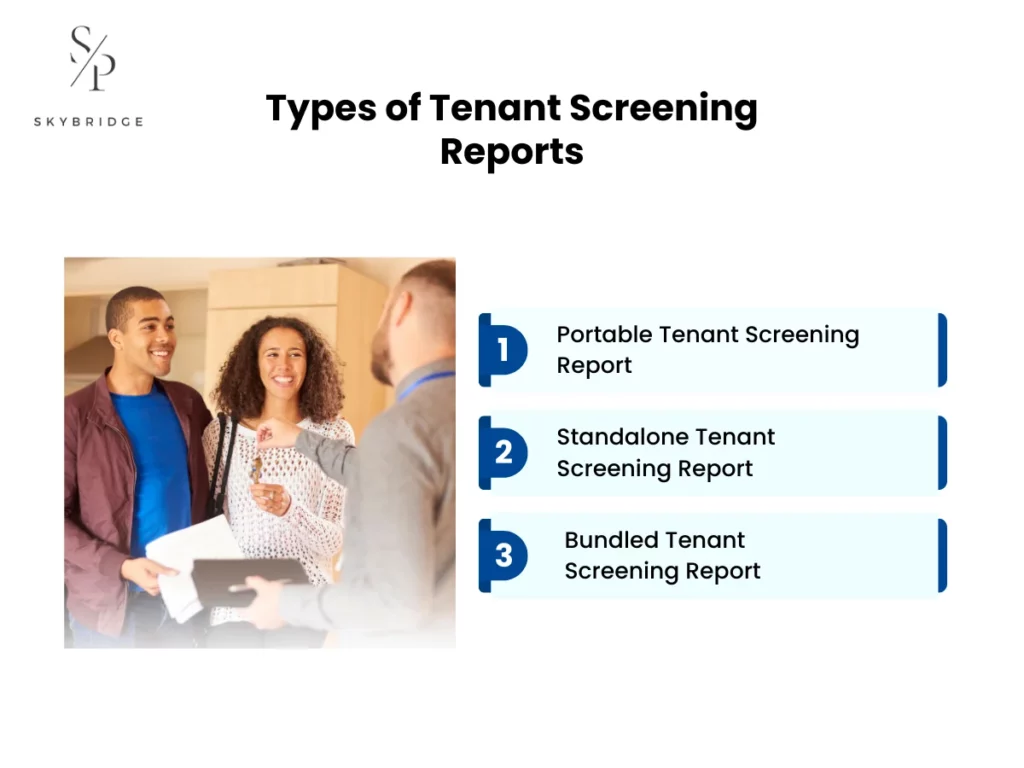
There are three main types of tenant screening reports: portable, standalone, and bundled. Portable reports are tenant-controlled and can be shared with multiple landlords, making them convenient. Standalone reports focus on one aspect, such as credit or criminal history, while bundled reports combine several checks, including credit, criminal, and eviction histories, for a more comprehensive view of the tenant.
Portable Tenant Screening Report
A portable tenant screening report is a tenant-owned report that can be shared with multiple landlords during their search for rental properties. This report is cost-effective as tenants only need to pay for it once and can reuse it across various applications. It typically includes important information such as the tenant’s credit score, criminal background, eviction history, and sometimes employment verification. Portable reports are ideal for tenants applying to multiple rentals, saving both time and money, while providing landlords with a quick snapshot of the applicant’s background.
Standalone Tenant Screening Report
A standalone tenant screening report focuses on a specific aspect of a tenant’s background, such as credit, criminal history, or eviction record. This type of report is useful when landlords only need to evaluate one factor of an applicant’s suitability, like confirming financial responsibility or checking for past evictions. Standalone reports are generally less expensive and quicker to obtain than bundled reports, but they may not provide the full picture of the tenant’s overall history. Landlords may choose this option if they are primarily concerned with one area, like credit reliability or criminal history.
Bundled Tenant Screening Report
A bundled tenant screening report offers a comprehensive background check by combining multiple checks into one report. This typically includes a credit report, criminal background check, eviction history, and sometimes rental history, providing landlords with a full picture of the tenant’s background. Bundled reports are ideal for landlords who want to assess all key factors before making a rental decision. While they may be more expensive, they reduce the risk of overlooking critical details and help landlords make well-informed decisions when selecting tenants.
Cost of Tenant Screening Reports
The cost of tenant screening reports typically ranges from $25 to $75, with pricing depending on the level of detail required and the service provider. Many screening services offer tiered pricing models, where basic reports start at the lower end, while more comprehensive reports, which include additional checks like criminal background or eviction history, cost more. Extra features such as income verification or reference checks can further increase the price.
Several factors influence the final cost of a tenant screening report. The number of checks included, such as credit, criminal, or eviction records, affects pricing, with more extensive screenings leading to higher costs. The screening provider also plays a role, as some services offer faster reports or more detailed checks for a higher fee.
When choosing a tenant screening report, landlords should carefully weigh their needs against the cost. While it is important to control expenses, investing in a more thorough report can help landlords make informed decisions and select reliable tenants, ultimately preventing costly rental issues in the future.
Legal Considerations for Rental Application Screening
Tenant screening must comply with the Fair Housing Act and the Fair Credit Reporting Act (FCRA). The Fair Housing Act prohibits discrimination based on race, gender, and disability, while the FCRA requires landlords to obtain written consent before accessing credit or background reports and provide a copy if adverse action is taken. These laws ensure fair and legal screening practices.
Fair Housing Laws and Tenant Screening
When conducting tenant screening, landlords must adhere to Fair Housing Laws, which ensure equal treatment for all applicants. The Fair Housing Act prohibits discrimination based on race, color, religion, sex, national origin, disability, or familial status. Landlords must apply consistent screening criteria for every applicant, ensuring that no one is unfairly denied housing based on protected characteristics. Non-compliance with these laws can lead to serious legal consequences, including fines of over $20,000 in federal court.
FCRA and State-Specific Regulations
The Fair Credit Reporting Act (FCRA) mandates that landlords obtain written consent from tenants before accessing their credit or background reports. If the report leads to adverse action, such as a rental denial, the landlord must provide the tenant with a copy of the report and an adverse action notice. State-specific regulations may impose restrictions, such as limiting the use of eviction records or criminal history beyond a certain period. For example, California restricts the use of eviction records older than seven years.
Tenant Rights During Screening
Tenants have specific rights that must be upheld during the screening process to ensure fairness and transparency. These rights, protected under the Fair Credit Reporting Act (FCRA), guarantee that tenants are informed, provide consent, and have the opportunity to review and dispute any inaccurate information in their screening reports. Here are the primary tenant rights during screening:
- Right to be Informed: Tenants must be notified that a background check will be conducted.
- Right to Consent: Tenants must provide written consent before their information can be accessed.
- Right to Receive the Report: If the screening results in adverse action, the tenant must be provided a copy of the report.
- Right to Dispute Errors: Tenants have the right to dispute any inaccuracies found in the report.
What are the Best Practices of Screening Tenants?
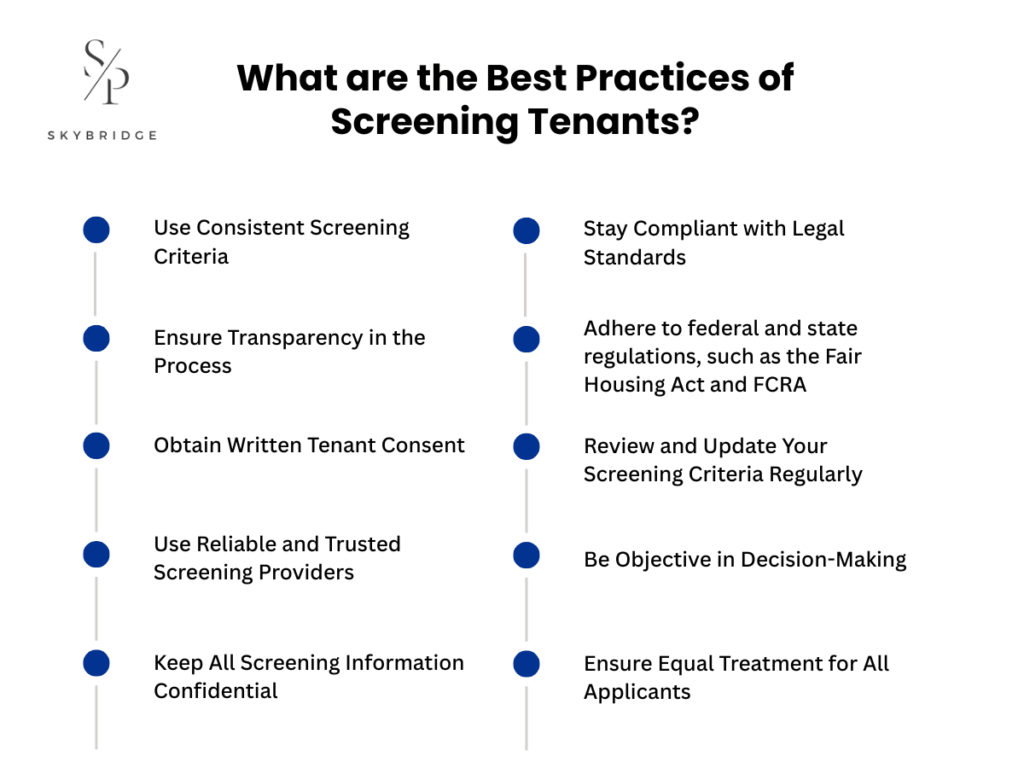
Best practices for tenant screening include applying consistent criteria, using trusted screening services, and ensuring transparency. Landlords should always obtain written consent, cover key checks like credit and criminal history, and comply with legal regulations to avoid discrimination. By following these practices, landlords can make informed, fair decisions and reduce potential risks.
- Use Consistent Screening Criteria
Apply the same screening standards to all applicants to maintain fairness and avoid discrimination. Using consistent criteria allows landlords to assess all applicants equally, ensuring no bias is introduced into the process, while also making the decision-making process more transparent and objective. - Ensure Transparency in the Process
Be upfront with tenants about what information will be checked during the screening. Clearly explain the types of checks, such as credit, criminal, or eviction history, that will be conducted. Transparency fosters trust and helps tenants feel more comfortable, knowing what to expect from the process. - Obtain Written Tenant Consent
Always obtain written consent from tenants before running background checks. This ensures compliance with laws like the Fair Credit Reporting Act (FCRA) and protects tenant privacy. It also sets clear boundaries, confirming that the tenant agrees to the screening process. - Use Reliable and Trusted Screening Providers
Choose a reputable tenant screening service that provides accurate, up-to-date reports. Reliable providers will ensure that the information gathered is both thorough and legally compliant, helping landlords make informed decisions based on verified data. - Keep All Screening Information Confidential
Protect the personal information of applicants by ensuring all screening data is kept secure and confidential. Only authorized individuals should have access to this information, and landlords should have clear protocols for securely storing and handling sensitive data to avoid potential breaches of privacy. - Stay Compliant with Legal Standards
Familiarize yourself with federal, state, and local regulations surrounding tenant screening. Staying up-to-date with laws like the Fair Housing Act and FCRA is crucial for avoiding legal issues, ensuring that your tenant screening process remains fair and non-discriminatory. - Adhere to federal and state regulations, such as the Fair Housing Act and FCRA
Compliance with the Fair Housing Act and the FCRA is essential to avoid legal violations. These laws ensure that landlords do not discriminate against applicants based on protected categories and that tenant information is handled with proper consent and transparency. - Review and Update Your Screening Criteria Regularly
Regularly review your screening criteria to ensure it is still relevant and legally sound. This includes staying updated with changes in the law and making necessary adjustments to reflect evolving practices, such as new regulations on the use of criminal records or eviction history in screening. - Be Objective in Decision-Making
Evaluate all applicants based on objective data rather than personal biases. Use the tenant’s credit score, rental history, and other factual information to guide your decision-making, which helps ensure fairness and reduces the risk of discrimination. - Ensure Equal Treatment for All Applicants
Treat all applicants equally, regardless of their race, gender, disability, or familial status. Consistently applying the same criteria to every applicant ensures compliance with the Fair Housing Act and prevents any appearance of bias or discrimination in the screening process.
State-Specific Tenant Screening
State-specific tenant screening laws vary and influence how landlords conduct background checks. For instance, California restricts the use of criminal records for offenses older than seven years, while New York limits the use of eviction records. In Illinois, landlords cannot discriminate based on arrest records. Landlords must be aware of these state laws to ensure their screening process complies with local regulations and avoids legal complications.
California Tenant Screening Regulations
California has specific tenant screening regulations that landlords must follow to comply with state and local laws. These rules are designed to protect tenants from discrimination while allowing landlords to evaluate the suitability of applicants. California’s laws, such as the “Ban-the-Box” law and the Fair Chance Act, restrict how criminal history is considered in the screening process, ensuring tenants are not unfairly excluded based on past offenses.
Key regulations include:
- Criminal Record Restrictions: Landlords cannot consider criminal history older than seven years unless it is directly related to the property.
- Eviction History Limitations: Eviction records older than seven years cannot be used in tenant screening decisions.
- Credit Check Regulations: Landlords must obtain written consent before conducting credit checks and cannot discriminate based on credit score alone.
California’s tenant screening regulations are designed to ensure fairness while protecting tenant rights. Landlords should stay updated on any changes in California’s laws and consult legal professionals if they have questions about tenant screening practices.
Eviction Record Limitations in California
In California, landlords are prohibited from considering eviction records older than seven years, ensuring applicants are not unfairly judged for past issues that occurred long ago. The Tenant Protection Act of 2019 (AB 1482) further protects tenants by requiring landlords to have a valid reason for eviction if the tenant has lived in the property for at least 12 months. This “just cause” protection ensures tenants are not evicted without legitimate grounds.
When an eviction occurs, landlords must provide notice to the tenant, with the timeline depending on the reason. The notice period can range from 3 days for non-payment of rent to 60 days for other reasons, giving tenants adequate time to respond or resolve the issue.
Criminal History Screening in California
California has strict regulations on using criminal history during tenant screening to prevent discrimination. The Fair Chance Act limits when and how criminal records can be considered, particularly regarding arrests or convictions that happened long ago. Landlords cannot deny applicants based solely on their criminal history unless it directly impacts the safety or operations of the rental property. This law ensures that individuals with past offenses are not unfairly excluded from housing opportunities, providing them with a chance to prove their suitability as tenants.
How Can Property Management Companies Help in Tenant Screening Reports?
Property management companies are valuable resources for landlords when it comes to tenant screening. These companies specialize in handling the screening process, offering a range of services that save landlords time, ensure legal compliance, and help find the most suitable tenants. With access to professional tools and databases, property management companies conduct comprehensive checks, including credit history, criminal background, and eviction records. By managing tenant screening, they streamline the process, reduce the landlord’s workload, and ensure compliance with legal requirements.

